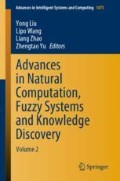Abstract
To address the problem of increasing computation caused by high-dimensional features, we propose a method for text sentimental analysis based on dimension reduction of Chi-square statistic (CHI) multi-grams mixture in this paper. It can not only effectively improve the effect of feature extraction, but also precisely determine the feature dimensions, which is different from the traditional methods using experience value. Experimental results show that the proposed method outperforms the exiting methods and the highest accuracy rate reached 94.85%. Moreover, it is proved that our method is universal for the subjective and objective classification as well as the different length of text classification reviews.
Access this chapter
Tax calculation will be finalised at checkout
Purchases are for personal use only
References
Tang, D., Wei, F., Yang, N., et al.: Learning sentiment-specific word embedding for Twitter sentiment classification. In: The 52nd Annual Meeting of the Association for Computational Linguistics, pp. 1555–1565 (2014)
Pak, A., Paroubek, P.: Twitter as a corpus for sentiment analysis and opinion mining. In: Proceeding of International Conference on Language Resources and Evaluation, pp. 17–23. European Languages Resources Association (ELRA), Valletta, Malta (2010)
Pang, B., Lee, L., Vaithyanathan, S.: Thumbs up?: sentiment classification using machine learning techniques. In: Proceeding of Empirical Methods in Natural Language Processing, pp. 79–86 (2002)
Venkatasubramanian, S., Veilumuthu, A., Krishnamurthy, A., et al.: A non-syntactic approach for text sentiment classification with stopwords. In: Proceeding of the ACM International Conference Companion on World Wide Web, pp. 137–138 (2011)
Duwairi, R.M., Qarqaz, I.: Arabic sentiment analysis using supervised classification. In: Proceeding of International Conference on Future Internet of Things and Cloud, pp. 579–583. IEEE (2014)
Onan, A., Korukoğlu, S., Bulut, H.: A multiobjective weighted voting ensemble classifier based on differential evolution algorithm for text sentiment classification. Expert Syst. Appl. 62, 1–16 (2016)
Li, H., Chai, Y.: Analyzing sentiment polarity of comments based on attributes. Data Anal. Knowl. Discov. 1(10), 1–11 (2017)
Dumais, S.T.: Latent semantic analysis. Annu. Rev. Inf. Sci. Technol. 38(1), 188–230 (2005)
Lifchitz, A., Jheanlarose, S., Denhière, G.: Effect of tuned parameters on an LSA multiple choice questions answering model. Behav. Res. Methods 41(4), 1201–1209 (2009)
Gálvez, R.H., Gravano, A.: Assessing the usefulness of online message board mining in automatic stock prediction systems. J. Comput. Sci. 19, 43–56 (2017)
Hu, X., Tang, J., Gao, H., et al.: Unsupervised sentiment analysis with emotional signals. In: Proceeding of the ACM International Conference on World Wide Web, pp. 607–618 (2013)
Tang, D., Wei, F., Qin, B., et al.: Sentiment embeddings with applications to sentiment analysis. IEEE Trans. Knowl. Data Eng. 28(2), 496–509 (2016)
Pang, B., Lee, L.: Seeing stars: exploiting class relationships for sentiment categorization with respect to rating scales. In: Proceeding of Association for Computational Linguistics. Association for Computational Linguistics, pp. 115–124 (2005)
Pearson, K.: On lines and planes of closest fit to systems of points in space. Phil. Mag. 2(6), 559–572 (1901)
Abdi, H., Williams, L.J.: Principal component analysis. Wiley Interdisc. Rev. Comput. Stat. 2(4), 433–459 (2010)
Pang, B., Lee, L.: A sentimental education: sentiment analysis using subjectivity summarization based on minimum cuts. In: Proceeding of Association for Computational Linguistics, pp. 271–278. Association for Computational Linguistics (2004)
Maas, A.L., Daly, R.E., Pham, P.T., et al.: Learning word vectors for sentiment analysis. In: Proceeding of the Association for Computational Linguistics: Human Language Technologies, pp. 142–150. Association for Computational Linguistics (2011)
Kennedy, A., Inkpen, D.: Sentiment classification of movie reviews using contextual valence shifters. Comput. Intell. 22(2), 110–125 (2006)
Martineau, J., Finin, T.: Delta TFIDF: An improved feature space for sentiment analysis. In: Proceeding of the International Conference on Weblogs and Social Media, pp. 258–261 (2009)
Acknowledgment
This work is supported by the National Natural Science Foundation of China (No. 61801440), the Fundamental Research Funds for the Central Universities and the Communication University of China’s state-of-the-art training research project (No. CUC18A015-1).
Author information
Authors and Affiliations
Corresponding author
Editor information
Editors and Affiliations
Rights and permissions
Copyright information
© 2020 Springer Nature Switzerland AG
About this paper
Cite this paper
Yin, F., Wang, Y., Liu, J. (2020). A Text Sentimental Analysis Method Based on Dimension Reduction of CHI Multi-gram Features Mixture. In: Liu, Y., Wang, L., Zhao, L., Yu, Z. (eds) Advances in Natural Computation, Fuzzy Systems and Knowledge Discovery. ICNC-FSKD 2019. Advances in Intelligent Systems and Computing, vol 1075. Springer, Cham. https://doi.org/10.1007/978-3-030-32591-6_67
Download citation
DOI: https://doi.org/10.1007/978-3-030-32591-6_67
Published:
Publisher Name: Springer, Cham
Print ISBN: 978-3-030-32590-9
Online ISBN: 978-3-030-32591-6
eBook Packages: Intelligent Technologies and RoboticsIntelligent Technologies and Robotics (R0)

